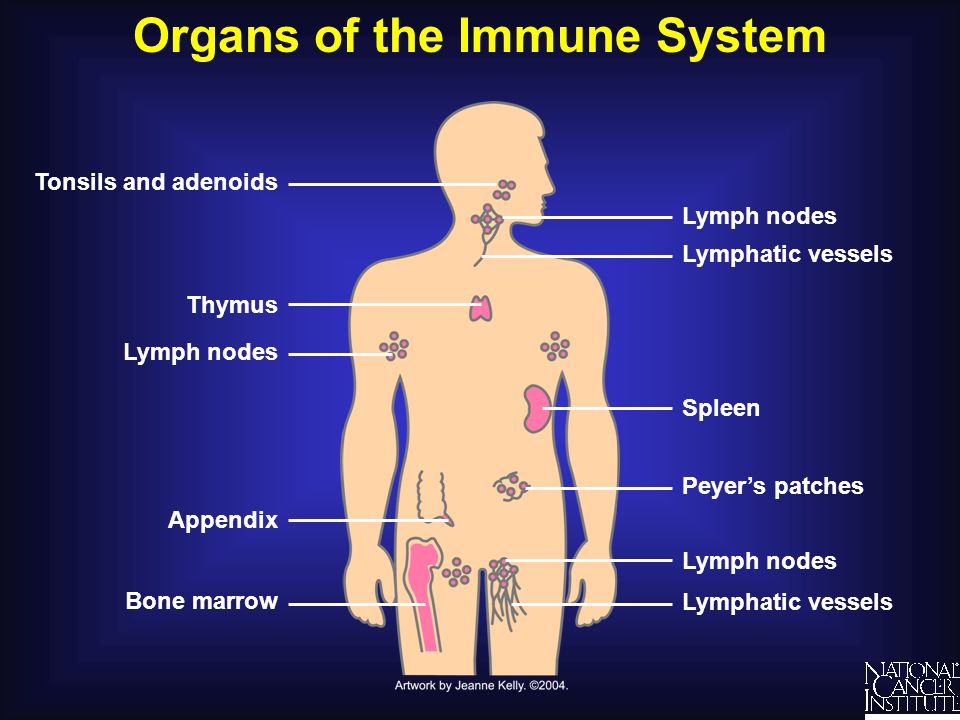
Share this
The immune system is a network of biological processes that protects an organism from diseases. It detects and responds to a wide variety of pathogens, from viruses to parasitic worms, as well as cancer cells and objects such as wood splinters, distinguishing them from the organism’s own healthy tissue. Many species have two major subsystems of the immune system. The innate immune system provides a preconfigured response to broad groups of situations and stimuli. The adaptive immune system provides a tailored response to each stimulus by learning to recognize molecules it has previously encountered. Both use molecules and cells to perform their functions.
Nearly all organisms have some kind of immune system. Bacteria have a rudimentary immune system in the form of enzymes that protect against viral infections. Other basic immune mechanisms evolved in ancient plants and animals and remain in their modern descendants. These mechanisms include phagocytosis, antimicrobial peptides called defensins, and the complement system. Jawed vertebrates, including humans, have even more sophisticated defense mechanisms, including the ability to adapt to recognize pathogens more efficiently. Adaptive (or acquired) immunity creates an immunological memory leading to an enhanced response to subsequent encounters with that same pathogen. This process of acquired immunity is the basis of vaccination.
Dysfunction of the immune system can cause autoimmune diseases, inflammatory diseases and cancer. Immunodeficiency occurs when the immune system is less active than normal, resulting in recurring and life-threatening infections. In humans, immunodeficiency can be the result of a genetic disease such as severe combined immunodeficiency, acquired conditions such as HIV/AIDS, or the use of immunosuppressive medication. Autoimmunity results from a hyperactive immune system attacking normal tissues as if they were foreign organisms. Common autoimmune diseases include Hashimoto’s thyroiditis, rheumatoid arthritis, diabetes mellitus type 1, and systemic lupus erythematosus. Immunology covers the study of all aspects of the immune system.

Reach for Elderberries

Modern Day Folk Medicine
Elderberrry is a shrub that has been used medicinally for centuries. Sambucus nigra, or black elderberry bush, is the version most commonly used to make syrup and lozenges. Extracts of elderberry have antiviral, anticancer, and anti-inflammatory properties. Elderberry is also high in flavonoids. People take elderberry syrup as a remedy for colds, flus, and bacterial sinus infections. The plant medicine works by reducing swelling in mucus membranes. Some studies suggest elderberry extract reduces the duration of the flu. If it works for flu infections, it may help your immune system against coronavirus (COVID-19) infection.
Elderberry Interactions
Elderberry benefits are numerous, however, the remedy may interact with certain prescription medications. Always check with your doctor or pharmacist prior to adding any new remedy to your regimen. Elderberry may interact with the following medications.
- Diurectics: Elderberry is a diuretic so taking it with a prescription diuretic will increase the effects.
- Laxatives: Elderberry has laxative effects, so it should not be taking with other laxative mediations.
- Steroids: Elderberry stimulates the immune system so it should not be taken with steroids and other medications designed to suppress the immune system. People who are on immunosuppressive drugs after having undergone organ transplantation should not take elderberry.
- Chemotherapy: Elderberry may interfere with chemotherapy and should not be taken with it.
- Diabetes medications: Elderberry lowers blood sugar so it should not be taken with medications that treat diabetes.
- Theophylline: Elderberry may reduce blood levels of this medication prescribed to treat asthma and respiratory conditions.
Have More Mushrooms

Immune System Boosters
Wondering how to boost your immune system? Eat more button mushrooms. Mushrooms are high in selenium and B vitamins like riboflavin and niacin. These minerals and vitamins are necessary for the immune system to work in tip top form. Mushrooms are also high in polysaccharides, sugar-like molecules that boost immune function.
Flavorful Fungus
Mushrooms have a savory quality that can enhance the flavor of many dishes. Not quite sure how to eat mushrooms? Try the following mouth-watering ways to serve up these tasty fungi.
- Sautéing, grilling, and roasting will help bring out the rich, savory flavor of mushrooms.
- Mushrooms make a great addition to scrambled eggs and omelets.
- Toss sliced mushrooms into soups, salads, or lasagna.
- Enjoy Portobello mushroom tops in veggie burgers.
- Stuffed mushrooms make tasty hors d’oeuvres.
Acai Berry Benefits

Antioxidant-Rich Berry
Acai berry is a black-purple fruit that is derived from the acai palm tree in Brazil, Trinidad, and certain parts of South America. The fruit is high in anthocyanins. These flavonoid molecules are very potent antioxidants. They combat oxidative stress in the body by mopping up free radicals. Antioxidants are credited with boosting immunity and lowering inflammation in the body. There’s never been a better time to enjoy an acai bowl!
Immune-Boosting Fruit
Acai berry is such a potent antioxidant and stimulator of the immune system, researchers are studying it as a potential treatment for all kinds of conditions. Areas of study include acai use in people with
- increasing prostate specific antigen (PSA);
- cardiovascular disease and metabolic syndrome;
- lower rectum cancer;
- constipation, and
- Other potential for studies could include other conditions (for example, yeast infections, Flu, COVID-19).
Oysters on the Menu

Seafood Superfood
Oysters are a nutritional powerhouse from the sea. One 3-ounce serving of Pacific oysters provides 190% of the daily value of selenium, 45% of the daily value of iron, and 20% of the daily value of vitamin C, all for just 140 calories. One 3-ounce serving of oysters contains 16 grams of high-quality protein. The seafood also provides zinc and vitamin A. These vitamins and minerals in oysters are critical for proper immune function.
Ways to Eat Oysters
Most people are familiar with raw oysters served in the half shell, but there are many other ways to eat oysters. These include
- oysters Rockefeller,
- oyster stew,
- oyster stuffing,
- scalloped oysters, and
- grilled oysters.
Pumped About Watermelon

Watermelon Nutrition
Watermelon is an immune-boosting fruit. One 2-cup serving of watermelon has 270 mg of potassium, 30% of the daily value of vitamin A, and 25% of the value of vitamin C. Calories in watermelon aren’t much at all. One 2-cup serving of watermelon has just 80 calories. Watermelon also provides vitamin B6 and glutathione. The body needs these vitamins, nutrients, and compounds like glutathione for proper immune function.
5 Ways to Eat Watermelon
Watermelon slices are the most common way to enjoy this fruit. Here are a few creative ways to eat watermelon.
- Make a fruit salad with watermelon and top it with a lemon, honey, and mint dressing.
- Have a tall glass of watermelon strawberry lemonade.
- Snack on arugula watermelon salad topped with feta cheese.
- Enjoy frozen watermelon sorbet.
- Cool off with watermelon, ginger, lime pops.
Try Some Wheat Germ

Wheat Germ Nutrition
Wheat germ is the innermost part of the wheat kernel. It is the most nutrient rich part of the grain. The germ is rich in B vitamins, zinc, and vitamin E. Sprinkle wheat germ on top of yogurt or cereal or add it to a shake. Wheat germ makes an easy addition to bump up the nutrition in baked goods. Substitute wheat germ for a bit of white flour in recipes to get some extra vitamins and minerals.
What Do You Do with Wheat Germ?
Most people know wheat germ makes a tasty topping sprinkled on fruit, yogurt, or cereal, but what else can you do with it? Wheat germ is a versatile food that can be used in a variety of recipes.
- Combine wheat germ, herbs, and spices to make a breaded coating for baked chicken and fish.
- Use wheat germ instead of breadcrumbs in meatloaf and meatballs.
- Sprinkle wheat germ on top of baked apple crumble and similar desserts.
Reasons to Like Low-Fat Yogurt

Dairy Health Food
Nutrition guidelines recommend adults consume 3 servings of dairy products per day. Low-fat yogurt provides 11 grams of protein, 250 calories, and almost 400 mg of calcium per 8-ounce serving. Low-fat yogurt can also help meet your daily requirement for vitamin B12, vitamin D, and vitamin B2 (riboflavin). Adequate levels of vitamin D and other nutrients are necessary for robust immune function. Yogurt is rich in probiotics, including Lactobacillus acidophilus, Lactobacillus casei, and Bifidus. These strains boost immune function and may even help reduce both the length and severity of colds. Beneficial gut flora are needed for proper digestion, detoxification, and immune function. Probiotics even help reduce eczema symptoms in babies.
5 Ways to Eat Yogurt
Most people eat yogurt straight out of the cup, but there are many other ways to enjoy this immune-boosting food.
- Mix yogurt, fruit juice, and a bit of honey. Pour into molds and freeze to make yogurt pops.
- Enjoy cucumber salad with yogurt dill dressing.
- Make coleslaw with yogurt instead of mayonnaise.
- Serve fish topped with minted yogurt sauce.
- Use yogurt in creamy soup recipes to give them a tart kick.
Super Spinach

Leafy Green Superfood
Spinach gets top billing as a superfood thanks to its high content of folate, vitamin A, vitamin C, fiber, magnesium, and iron. The nutrients in spinach boost immune function and provide the body with necessary nutrients for cell division and DNA repair. Reap maximum benefits from spinach by eating it raw or lightly cooked to preserve nutrients.
Think Beyond Spinach Salad
Most people are familiar with spinach salad, but how else can you prepare spinach? Surprisingly, there are a lot of ways to enjoy this nutritious, leafy green veggie including
- spinach-artichoke dip,
- creamed spinach,
- spinach lasagna,
- garlic sautéed spinach, and
- spinach and cheese stuffed pasta shells.
Tea Time

A Cup of Immunity
About half the population in the United States drinks tea regularly. Antioxidants in tea called polyphenols and flavonoids are credited with boosting immune function. These compounds may also reduce the risk of heart disease. Drinking green tea favorably affects blood lipids, increasing good HDL cholesterol and decreasing LDL bad cholesterol, triglycerides, and total cholesterol.
Beyond the Tea Cup
Tea is not just confined to be enjoyed by the cup. Amazingly, you can use teas in many of your favorite recipes. Think outside the cup!
- Add powdered tea to softened butter to make a savory spread.
- Cook grains and noodles in tea instead of stock.
- Use powdered tea as a rub to infuse meats with unexpected flavor.
- Make tea infused dairy to use in cream sauces for pasta and rice dishes.
- Add powdered tea to shortbread dough to make tea cookies.
Say Yes to Sweet Potatoes

Orange Spuds Are Better
One medium sweet potato packs a whopping 120% of the daily value of vitamin A and 30% of the daily value of vitamin C, all for just 100 calories. These vitamins are crucial for immune function and great for your skin. Sweet potatoes are a cholesterol-free and fat-free food, so you get all the helpful, immune-boosting vitamins without the guilt. Sweet potatoes serve up a healthy portion of fiber, too.
Sweet Potato Recipes to Savor
The deep, rich color of sweet potatoes reflects the high vitamin A content. These bright, orange root veggies can be whipped up in a variety of ways. Try these sweet potato dishes on for size.
- savory sweet potato fries
- sweet potato casserole
- twice baked sweet potatoes
- sweet potato pie
- sweet potato beet chips
Bring on the Broccoli

Broccoli to the Rescue
Broccoli is a nutrient-packed powerhouse to support your immune system. One cup of broccoli provides as much vitamin C as an orange. The veggie is also high in beta-carotene, potassium, magnesium, zinc, and iron. Broccoli supplies an array of B vitamins (B1, B2, B3, and B6). Together, these vitamins and minerals help the immune system to run in top form. Another healthy compound offered up by broccoli: glutathione, the master antioxidant in the body.
5 Ways to Enjoy Broccoli
Not a fan of broccoli? Some people love it, some hate it, but broccoli is such a nutritious vegetable, it makes sense to find a way to eat more of it. Broccoli can be prepared in ways that are so tasty, you’ll crave it! Try the following broccoli dishes on for size.
- creamy broccoli and cheese soup
- broccoli casserole
- broccoli salad
- lemon braised broccoli
- roasted broccoli rabe
Harness the Power of Garlic Cloves

Bring on the Bulbs
People have praised garlic for ages for its immune boosting properties. Garlic has antibacterial, antiviral, and anti-fungal properties. The bulbs are rich in antioxidants that quench free radicals that play a role in Alzheimer’s disease, heart disease, cancers, and other conditions. The antiviral properties may be helpful in reducing the severity of colds, flu or COVID-19 infections. In one study, people who took garlic supplements during cold season caught fewer colds than those who took placebo pills. If you do catch a cold, garlic can shorten the duration of it. If you do try garlic supplements, be mindful that the one you choose contains the active ingredients contained in real garlic.
Garlic and Cancer
Garlic boosts the portion of the immune system that is tasked with fighting viruses and cancer. Several studies have documented a link between garlic use and reduced rates of many different types of cancers. People who regularly consume lots of raw or cooked garlic have 30% to 35% fewer colorectal cancers than those who do not eat the allum. In one small study of people who had inoperable pancreatic, colorectal, or liver cancers, immune function was improved when participants took aged garlic extract for 6 months.
Miso Soup to the Rescue

Fermented Foods and Immunity
Miso soup has been a staple in Japanese cuisine for centuries. Miso is a salty paste made from fermented soybeans. It is rich in probiotics that are beneficial for gastrointestinal health and boosting the immune system. A lack of beneficial bacteria or an imbalance of bacteria in the GI tract is associated with a variety of medical conditions including irritable bowel syndrome (IBS), food allergies, gastroenteritis, inflammatory bowel disease (ulcerative colitis and Crohn’s disease), and even certain kinds of cancers. Sipping a cup of miso soup is a great way to introduce beneficial food-based probiotics into the GI tract.
Busy Little Bugs
Beneficial microorganisms found in miso soup and other fermented foods perform a variety of necessary functions in the GI tract. They synthesize vitamins and amino acids. They produce short-chain fatty acids (SCFAs) that the cells lining the GI tract use for fuel. The probiotics establish a healthy balance of flora in the gastrointestinal tract, protecting against pathogenic strains that try to take hold. About 70% of the immune system lies in the gut. Healthy, balanced gut flora makes for a strong immune system.
Chicken Soup for the Cold

Serving Up a Bowl of Relief
Mom was right to make a pot of homemade chicken soup when you got sick. It turns out there are very real, scientific reasons chicken soup helps you get over a cold more quickly. When cold viruses invade tissues of the upper respiratory tract, the body responds by triggering inflammation. This inflammation signals white blood cells to move to the area and stimulates the production of mucus. Ingredients in chicken soup appear to halt the movement of white blood cells, thereby decreasing mucus associated with colds. Too sick to cook from scratch? Canned chicken soup can ease cold symptoms, too.
More Cold-Fighting Remedies
To get over a cold more quickly, sip lots of warm liquids like chicken soup, ginger tea, and warm water with lemon. Staying hydrated helps thin mucus secretions and flushes the virus out of your body. Taking zinc lozenges, syrup, or tablets within 24 hours of exhibiting cold symptoms can help reduce the duration of a cold. Taking vitamin C supplements throughout cold season may not keep you from catching a cold, but it may help ease symptoms if you do catch one. It may ease symptoms of the flu and coronavirus infections, too.
Reap the Rewards from Pomegranate Juice

Harness Purple Power
Beneficial compounds in pomegranate extract have been found in lab studies to inhibit the growth of harmful types of bacteria including E coli O157:H7, Salmonella, Yersinia, Shigella, Listeria, Clostridium, Staphylococcus aureus, and other organisms. There’s also evidence pomegranate compounds inhibit the growth of bacteria in the mouth that contribute to periodontal disease, plaque buildup, and gingivitis. Pomegranate extracts have antiviral properties against the flu, herpes, and other viruses. In addition to fighting bad viruses and bacteria, there is evidence that pomegranate extracts promote the growth of beneficial gut flora that boosts the immune system including Bifidobacterium and Lactobacillus.
5 Ways to Enjoy Pomegranate
Most people enjoy pomegranate by eating the jewel-colored seeds after cutting open the fruit. There are many other ways to indulge in pomegranate.
- Add tart, colorful pomegranate seeds to fruit salad.
- Cool down with pomegranate lemonade on hot summer days.
- Make a lovely salad with watercress, endive, blood oranges, and pomegranate seeds.
- Mix pomegranate seeds into wild rice pilaf.
- Use pomegranate seeds to make a tasty relish to top meats.
Make Friends with Ginger

Anti-inflammatory Root
Antioxidant compounds in ginger root have potent anti-inflammatory and immune-boosting properties. Normal metabolic processes in the body, infections, and toxins all contribute to the production of free radicals resulting in oxidative stress. Antioxidants in foods like ginger quench free radicals and help guard against arthritis, cancer, neurodegenerative disorders, and may other conditions. Grate some fresh ginger and steep it in hot water to make tea. Fresh grated ginger also makes a great addition to healthy stir fried veggies. Ginger has proven antibacterial and antiviral properties.
5 Ways to Eat Ginger
What can you do with ginger root? A lot! Here are a few ideas to add more ginger to your menu.
- Add ginger to hot chocolate for an unexpected kick.
- Grated ginger makes a lovely addition to carrot cake or spice muffins.
- Make a ginger orange glaze to enjoy over salmon filets.
- Add ginger to marinades for meats.
- Enjoy honey ginger chicken wings.
Maximizing the health of your immune system is easy when you know which foods to eat. Eat these 16 immune-boosting foods to keep your immune system in the topmost form.
Top 15 Immune System Boosters
Prepare to Strengthen Your Immune System

With the recent coronavirus (COVID-19) outbreak, many people are concerned about staying healthy and maintaining a healthy immune system. Doing so can benefit your body and boost your defenses against viruses, bacteria, and other pathogens. On the following slides, we’ll cover the top immunity boosters tips to help you and your body stay strong to fight off infections.
Is Stress Bad for You?

Chronic stress depresses the immune system and increases the risk of several types of illnesses. It raises the level of hormones called catecholamines. Being stressed out leads to increased levels of suppressor T cells, which suppress the immune system. When this branch of the immune system is impaired, you are more susceptible to viral illnesses including respiratory conditions like colds, flu, and the novel coronavirus infection. Stress leads to the release of histamine, a molecule involved in allergies. Combat stress with strategies like deep breathing, meditation, exercise, and relaxation.
Can Sex Boost Your Immune System?

Regular Sexual Activity Is Helpful
In a study of college students, those who had sex once or twice per week had the highest levels of immunoglobulin A (IgA) in their saliva. IgA is an immune molecule that helps protect us against illnesses like the common cold. Students who had sex once or twice per week had more salivary IgA than students who were not sexually active, infrequently sexually active (less than once a week), or who were very sexually active (three or more times per week). Enjoying sex up to a couple of times per week seems to be the sweet spot for promoting optimal IgA levels.
Do Pets Help Immune System Function?

Companion Animals Are a Boon to Immunity
Results of studies show that pet owners have lower blood pressure and cholesterol levels compared to those who do not own pets. Pet owners had lower total cholesterol and triglycerides compared to non-pet owners. This may translate to better overall heart health and reduced risk of heart disease. Dog owners may enjoy improved heart health in part because they are more likely to engage in physical activity because they walk their dogs regularly. Pet ownership in childhood is linked to decreased susceptibility to allergies.
Do Social Ties Influence Immunity?

Your Social Network Can Make You Stronger
Mounting evidence from many studies suggests loneliness and social isolation are very detrimental to health. In one study, those with the strongest social relationships were most likely to live longer than those with poor social connections. There are lots of ways to develop and strengthen social ties. Pick up the phone and call friends regularly. Make plans to get together in person. Volunteer for a cause you believe in. Join a class or join a group related to an interest or hobby you have. Keep up with old friends and make new ones to strengthen and expand your social circle.
Attitude Is Everything

Be Positive to Boost Immune Response
Expect good things and your immune system will follow. A study of law students found that their immune systems were stronger when they felt optimistic. Make optimism work for you. Try to see the glass as half full, not half empty. Practice gratitude and think of at least three things that you are grateful for every day. Imagine the best outcome for situations, even difficult ones. You may not always be able to control events around you, but you can always decide how to respond to them. Respond with a good attitude to increase the chances of the best outcome and to strengthen your immunity.
Laugh It Up!

Belly Laughs Are Good for You
Can laughter really boost your immune system? Results of some studies suggest it can. In a study of healthy males, watching a funny movie boosted natural killer cell activity while watching an emotionally neutral movie did not boost immune system function. While more research is necessary to establish a conclusive link between laughter and improved immunity, go ahead and have a good chuckle. Belly laughs feel great. They can’t hurt and they might help boost your immune system and reduce the likelihood of illness.
What About Antioxidants?

They Protect Your Cells
Antioxidants are compounds in colorful fruits and vegetables that protect against free radicals. Free radicals can damage DNA and other cell components. Fruits and vegetables in a wide array of colors provide the best mix of protective antioxidants to boost overall health and immunity. Eat leafy greens, watermelon, carrots, berries, broccoli, oranges, kiwi, cantaloupe, and other brightly colored produce to give your cells and immune system all the natural protection they need to function at their best. Homemade chicken soup with carrots, celery, and other veggies can also be a boon to your immune system.
Does Vitamin Status Matter?

A Multivitamin May Help
Some experts believe that taking a daily multivitamin can help ensure you’re meeting at least your daily minimum requirement for certain nutrients. Vitamins that are critical for immune function include vitamins A, C, D, and E. Zinc, selenium, and magnesium are minerals that your immune system needs to function at its best. These minerals are also critical for the function of many enzyme reactions in the body. Your immune system and body can’t function at their best without the basic building blocks they need to work properly.
What About Empty Calories?

Steer Clear of Them
Processed foods including candy, soda, fast food, and snack foods contain empty calories that do not provide your body with vitamins, nutrients, or fiber. They often also contain chemicals and preservatives that are not good for your body. If you eat processed foods and instead of foods in their natural, unprocessed form, your body will be deprived of vitamins and nutrients that it needs to thrive. Ditch processed foods in favor of fruit, vegetables, lean meat, healthy fats, and whole grains to give your body and immune system everything they need to function at their best. Optimize your dietary habits to support your health.
Herb and Supplement Immune Boosters

Healing Plants
Some research has suggested that compounds in herbs and supplements can enhance immunity. Garlic, astragalus, milk thistle, ginseng, green tea, black cumin, and licorice are just a few herbs that have been reported to have immune boosting benefits. Talk to your doctor of pharmacist before including herbs and supplements into your regimen. They may produce side effects, especially when combined with other herbs, supplements, or medications. Probiotics are beneficial strains of bacteria that have also been described as immune boosters. Look for probiotic supplements with lactobacillus and bifidobacterium. Probiotics can also help improve digestive health.
Does Exercise Boost Immunity?

Move Your Body
Exercise has numerous health benefits including protecting you against heart disease, osteoporosis, and even certain types of cancer. Exercise is also an immune booster. To reap maximum benefits, try to be moderately physically active for at least 30 minutes on most days of the week. Walking is one of the simplest ways to exercise. If you’re not excited about walking, try yoga, swimming, cycling, or golf. Gardening is also a good way to get some outdoor activity.
Sleep Your Way to a Better Immune System

Make Sleep a Priority
Several studies confirm the link between sleep and a healthy immune system. Most people need between 7 to 9 hours to feel adequately rested. Being well rested improves the function of white blood cells, so you’re less likely to get illnesses like respiratory infections, colds, and the flu. Practice good sleep hygiene to optimize sleep. That means waking up and going to bed at the same time every day, even on weekends. Avoid substances that can interfere with sleep, like caffeine and alcohol, for several hours before bedtime. You’re more likely to sleep well if your bedroom is cooler. Establish a relaxing evening routine before bedtime. Enjoy a warm bath, relaxing music, or a cup of tea to help you drift off to sleep more easily.
Is It Safe to Drink Alcohol?

It Is Best to Limit It
Alcohol depresses the immune system so it’s best to drink it in moderation or not at all. Men may be able to consume up to two alcoholic drinks per day. Women should have no more than one. Whether or not one can safely consume some alcohol has to do with many factors including overall health status, risk factors for disease, and any medications you may be taking. Ask your doctor if it’s safe for you to indulge in an occasional alcoholic drink and if so, how much is safe for you to consume.
Nicotine Is Immunosuppressive

A Dangerous Substance
Smoking and nicotine use are bad for the immune system. People who use tobacco are also at increased risk of health problems like lung cancer, asthma, stroke, and heart attack. Any substance that depresses your immune system is not something that you want to use. There are many different strategies to help you quit. Your doctor may recommend nicotine patches, antidepressants, or other treatments to help you stop smoking. Reach out for help if you need it.
Can Handwashing Keep You Healthy?

Suds Up to Protect Your Health
Frequent handwashing is a simple and effective way to prevent the spread of respiratory infections like colds, flu, coronavirus, diarrheal illnesses, and other infectious conditions. Some germs are easily transmissible from person to person when we come into contact with one another. It’s easy to transfer germs from your hands to your nose, eyes, and mouth, if you touch them. This can get you sick. Wash your hands with soap under running water. Scrub the fronts and backs of your hands as well as in between fingers. Antibacterial soap and hand sanitizer may confer additional protection against microorganisms. Use an alcohol-based hand sanitizer that is at least 60% alcohol for times when you don’t have access to soap and water.






